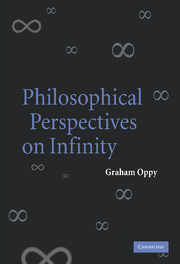Book contents
- Frontmatter
- Contents
- Preface
- Acknowledgments
- Introduction
- 1 Beginnings and Puzzles
- 2 Mathematical Preliminaries
- 3 Some Cases Discussed
- 4 Space, Time, and Spacetime
- 5 Physical Infinities
- 6 Probability and Decision Theory
- 7 Mereology
- 8 Some Philosophical Considerations
- 9 Infinite Regress and Sufficient Reason
- Conclusion
- References
- Index
8 - Some Philosophical Considerations
Published online by Cambridge University Press: 31 July 2009
- Frontmatter
- Contents
- Preface
- Acknowledgments
- Introduction
- 1 Beginnings and Puzzles
- 2 Mathematical Preliminaries
- 3 Some Cases Discussed
- 4 Space, Time, and Spacetime
- 5 Physical Infinities
- 6 Probability and Decision Theory
- 7 Mereology
- 8 Some Philosophical Considerations
- 9 Infinite Regress and Sufficient Reason
- Conclusion
- References
- Index
Summary
To this point, the discussion of various different subject areas – spacetime, physics, probability, decision, mereology – has taken classical mathematics more or less for granted. But there are various more fundamental considerations that need to be taken into account in assessing the material that we have already examined.
We begin with an account of some basic distinctions that are frequently adverted to in discussions of the infinite: the distinction between actual and merely potential infinities, the distinction between completed and incomplete infinities, the distinction between additive and accretive infinities, and the distinction between abstract and concrete infinities.
Next, we turn our attention to pure mathematics and to the range of views that it is possible to take about the infinite in pure mathematics. We propose some very general constraints that it is plausible that any acceptable philosophy of pure mathematics must accept, and set out a rough taxonomy. In the light of that taxonomy, we then consider various ways in which one might try to justify the claim that it is reasonable to accept the axioms and methods of classical mathematics.
After a brief survey of some of the outstanding problems that are raised by classical set theory, we turn to the question of the range of views that it is possible to take about the infinite in applied mathematics, connecting the discussion in the previous parts of this chapter to the discussion in earlier chapters of this book.
- Type
- Chapter
- Information
- Philosophical Perspectives on Infinity , pp. 231 - 274Publisher: Cambridge University PressPrint publication year: 2006



